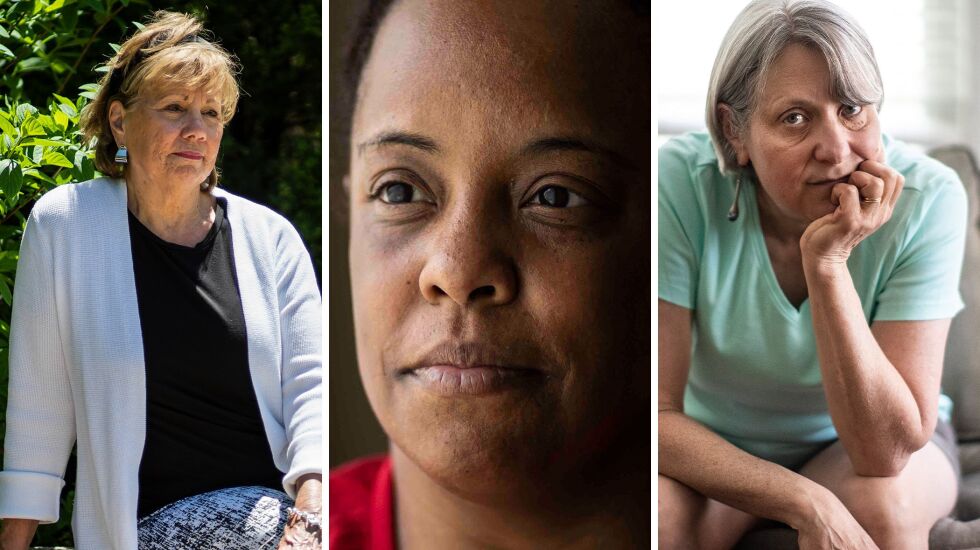
More than four decades after having an abortion, Amy isn’t sure whether protesting will be enough to ensure others will one day again have the same choices she had at 19.
She knew the U.S. Supreme Court would likely overturn the historic Roe v. Wade decision that had legalized abortions years before she had her own. Still, on Friday, hours after the high court published its opinion, she was still wrapping her head around the new reality.
“Our government is not going to help us. We have to help each other,” said Amy, who plans to keep raising money for abortion funds and helping those who will seek an abortion in Illinois, where it remains legal.
Amy was one of nine people from around Chicago who shared their stories of having had an abortion with the Chicago Sun-Times earlier this month in anticipation of Friday’s decision, which will result in some states banning the medical procedure.
While some expressed anger and disappointment hours at the ruling, one saw it as an answered prayer.
In Illinois, abortion will remain legal, and Gov. J.B. Pritzker already has called on the General Assembly to further protect abortion access.
Even before Friday’s opinion, Illinois was becoming a haven for those seeking an abortion. In 2020, 9,686 people who traveled from out-of-state had an abortion in Illinois, up from 7,534 in 2019, according to figures from the Illinois Department of Public Health.
In 2019, Ana Santoyo already faced hurdles getting two abortions in the Chicago area. She sought the abortions because the fetuses had cystic fibrosis, a genetic condition that shortens life expectancy. Santoyo said she didn’t have insurance the first time, and the abortion was delayed because of staffing issues.
The second time, she had to pay out of the pocket while juggling the responsibilities of attending graduate school and being a mother, she said.
“It’s not an easy thing in any case, and I think that’s important because that’s who this decision will affect — poor and working-class women,” Santoyo said. “We have to fight for these protections to control our own bodies.”
She had spent early Friday morning waiting for the Supreme Court’s decision to be made public, then was planning to join protests in Chicago.
Santoyo said she believes that the movement in support of abortion rights needs to become as militant as it was before Roe v. Wade.
“Those two abortions made my family what it is today, and the things I was able to access, I even feel lucky for myself,” Santoyo said. “You see the need to be in the streets right now.”
Devetta, another Chicago area woman who previously shared her story with the Sun-Times of having an abortion, said she never had contacted her legislators before but will do so now to urge them to act. And, like Santoyo, she planned to join protests in the coming days.
“It makes me angry because now, from this point forward, women won’t have the same options that I had, and that angers me because every woman should have the right to have the option to do what she wants with her body,” Devetta said.
She said she had an abortion more than two decades ago, at 16, after being raped by an Army recruiter. Her mother accompanied her to a clinic for the abortion.
She said she thinks about where another woman might be if she hadn’t been able to get an abortion in a similar situation.
“She might have raped by a father or uncle or a sibling or a somebody, and what happened to me, I just want people to know that abortion can be safe, and it can be legal,” Devetta said. “It might not be an option for everyone, but let it be an option.”
Catherine Walker, another woman who previously went public with her story of having had four abortions, watched the news after the decision was announced. She’s now a strong anti-abortion advocate.
“It’s an answer to prayer,” Walker said of the court ruling.
Decades after her abortions, Walker has been sharing her views by doing sidewalk counseling outside clinics that perform abortions and plans to continue to do that.
For Stephanie Skora, the chief operating officer for the Black-led, trans-led LGBTQ+ center in Chicago called Brave Space Alliance, what Justice Clarence Thomas wrote as part of the majority who struck down Roe makes her fear that the court could also reexamine past decisions that have secured LGBTQ+ rights.
“I think we’re looking at a pivotal moment for this country, where we’re hurtling toward what amounts to a religious dictatorship meted out through decisions of the court and potentially the legislature and the presidency,” Skora said.
Elvia Malagón’s reporting on social justice and income inequality is made possible by a grant from The Chicago Community Trust.







